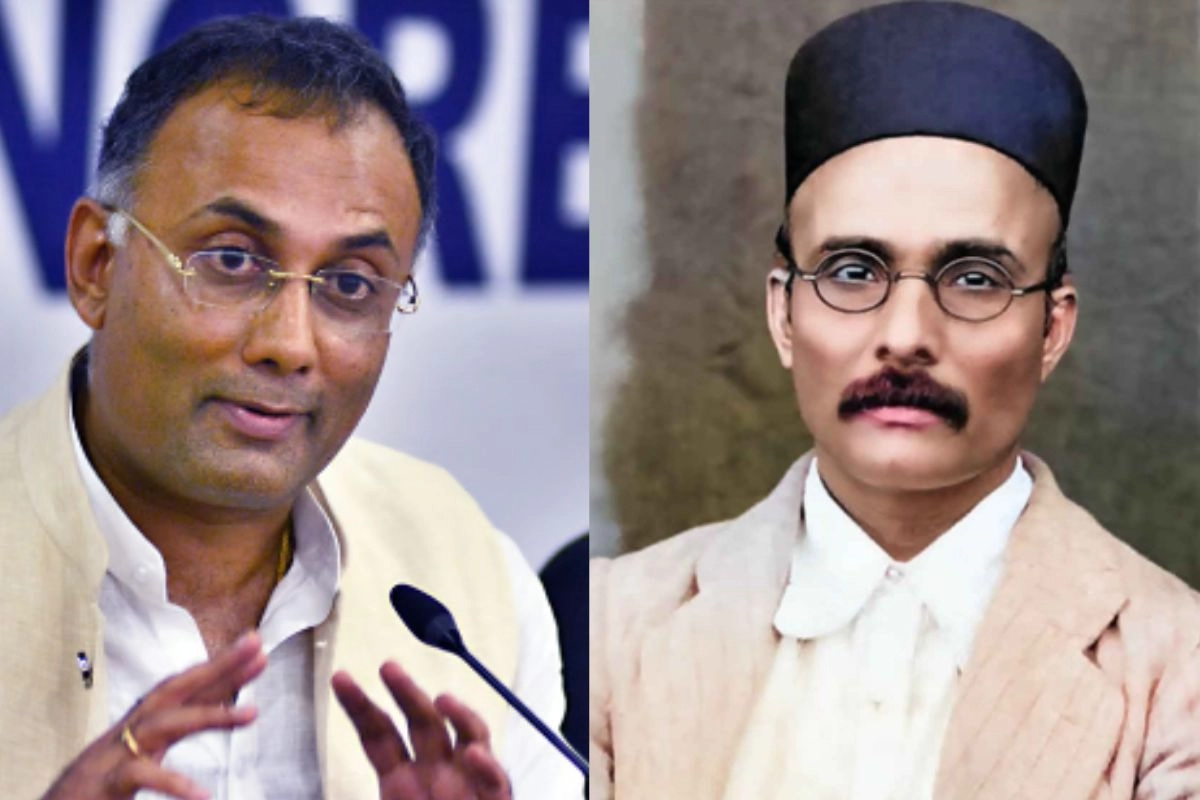Veer Savarkar: Karnataka Health Minister Dinesh Gundu Rao has now expressed a stern condemnation of Veer Savarkar’s version of fundamentalism, going to say that Mahatma Gandhi’s democratic ideology is the best antidote to such ideologies. Speaking to ANI, Rao elaborated on the potential dangers that fundamentalism poses, as exemplified by such elements as Nathuram Godse, the murderer of Mahatma Gandhi, in whose defense he described himself as the result of Savarkar’s thought process.
The Dangers of Fundamentalism
“Someone like Godse who assassinated Mahatma Gandhi was a fundamentalist as he believed what he was doing was right. This is the danger of fundamentalism” he stated. Dinesh Gundu Rao added that, “Even though you do all the most heinous crimes, you think that you are doing it for a greater cause. Suppose some ‘gaurakshak’ goes and kills or beats up somebody, he does not think that he is doing something wrong. He thinks he is doing it for a greater cause.”
Rao underscored that such an attitude – wherein citizens commit crimes with the aim of doing what they feel is a greater good- poses a great threat to societal harmony. “The true way to counter Savarkar’s fundamentalism is Gandhi’s democratic principles and his approach…Fundamentalism should be countered from all angles. I did not mention the BJP yesterday as I don’t want to make it political. This approach that for the higher purpose of wanting to build a Hindu Rashtra, I can do any crime, anything for that cause and there is nothing wrong in that is something very dangerous.”
Mahatama Gandhi as the Counter of Veer Savarkar
Rao as opposed to thoughts of Veer Savarkar presented Mahatma Gandhi as an antidote against fundamentalism epidemic. He described Gandhi as an extremely religious person who was not antithetical to the thought process of religion but, instead, believed in principle of inclusiveness and democratic values. “That is the danger of Savarkar’s fundamentalism…That fundamentalism is taking bigger roots in the country. The greatest counter to it is Mahatma Gandhi, who is deeply a religious man,” Rao remarked. He lauded the Gandhian principles of consensus and reconciliation as vital instruments for creating a more inclusive society.
The above statements were made by Rao while launching the Kannada version of “Gandhi’s Assassin: The Making of Nathuram Godse and His Idea of India,” penned by journalist Dhirendra K. Jha. On this occasion, again, Rao stressed that Savarkar’s philosophy is utterly different from that of Indian culture, saying that it is Gandhi’s thoughts that must be implemented in the discussion over India’s future.
Political Reactions and Controversy after Rao’s Remarks on Veer Savarkar
Bjp Takes shots on Rao’s statement. BJP leader Mukhtar Abbas Naqvi dubbed Rao’s allegations as a “lost mental balance,” saying such statements are not worthy of serious thought.
Ranjit Savarkar, the grandson of Veer Savarkar, said Congress has consistently defamed Savarkar, particularly when the general elections are near. According to him, it is a strategy of divide and rule, with an aim to break the Hindu society on the basis of caste divisions. Threatening to sue Rao, Ranjit said that his statements about Savarkar’s diet were factually incorrect.
Maharashtra Deputy Chief Minister Devendra Fadnavis reacted equally to Naqvi as he said that the Congress was found to be fundamentally wrong in its version of Savarkar. He claimed that the party was continuing false narratives on Savarkar as that was a blow to the dignity deserved by the freedom fighters of India for which Savarkar himself had fought.
Anurag Thakur Labeled Congress as ‘Factory of Lies’
BJP leaders have interpreted Rao’s statements as a vindication of a larger smear campaign against Savarkar, indicating that Congress has got it wrong about the significance of his contribution to the nation. Anurag Thakur from BJP termed Congress as a “factory of lies” and alleged that they are compromising with the legacies of freedom fighters by manufacturing stories against them. Attacks on Savarkar: A symptom of a larger Indian historical leadership disrespect mentality; it is time that the Indian leadership leaders’ role in the contemporary discourses be portrayed in much more respectful and closer to reality.
Statements by Dinesh Gundu Rao have kicked up an enormous debate on how one ought to read Indian history, and fundamentalist narratives will continue to stay relevant. Using Gandhi as a counter-narrative to fundamentalist ideologies such as that propagated by Savarkar, Rao may attempt to reboot democratic values forming the substructure of India’s pluralistic nature. These debates are likely to continue as the new government assumes responsibility in the face of growing political tensions in the country and in shaping the nature of any subsequent ‘order’ imposed on India.
